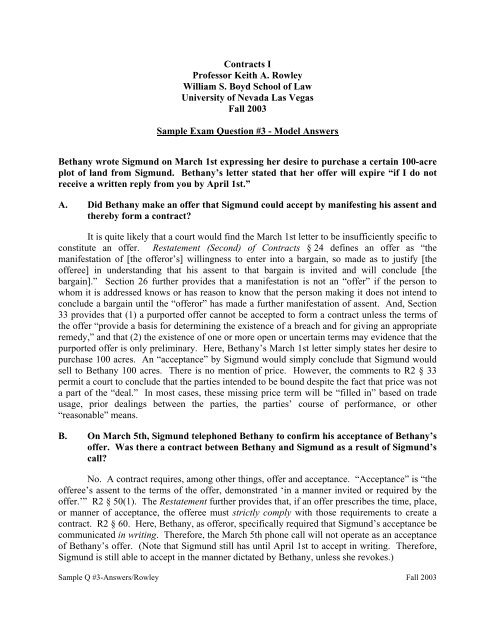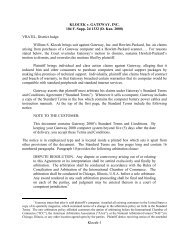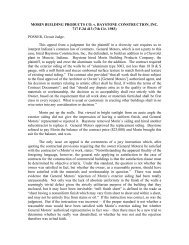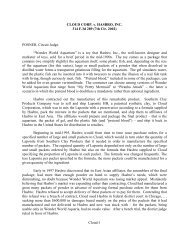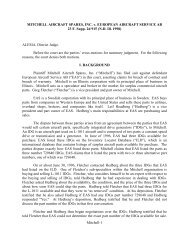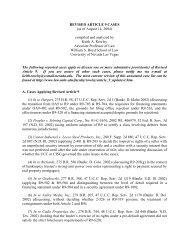Sample Exam Question #3 - William Boyd School of Law - University ...
Sample Exam Question #3 - William Boyd School of Law - University ...
Sample Exam Question #3 - William Boyd School of Law - University ...
Create successful ePaper yourself
Turn your PDF publications into a flip-book with our unique Google optimized e-Paper software.
Contracts I<br />
Pr<strong>of</strong>essor Keith A. Rowley<br />
<strong>William</strong> S. <strong>Boyd</strong> <strong>School</strong> <strong>of</strong> <strong>Law</strong><br />
<strong>University</strong> <strong>of</strong> Nevada Las Vegas<br />
Fall 2003<br />
<strong>Sample</strong> <strong>Exam</strong> <strong>Question</strong> <strong>#3</strong> - Model Answers<br />
Bethany wrote Sigmund on March 1st expressing her desire to purchase a certain 100-acre<br />
plot <strong>of</strong> land from Sigmund. Bethany’s letter stated that her <strong>of</strong>fer will expire “if I do not<br />
receive a written reply from you by April 1st.”<br />
A. Did Bethany make an <strong>of</strong>fer that Sigmund could accept by manifesting his assent and<br />
thereby form a contract?<br />
It is quite likely that a court would find the March 1st letter to be insufficiently specific to<br />
constitute an <strong>of</strong>fer. Restatement (Second) <strong>of</strong> Contracts § 24 defines an <strong>of</strong>fer as “the<br />
manifestation <strong>of</strong> [the <strong>of</strong>feror’s] willingness to enter into a bargain, so made as to justify [the<br />
<strong>of</strong>feree] in understanding that his assent to that bargain is invited and will conclude [the<br />
bargain].” Section 26 further provides that a manifestation is not an “<strong>of</strong>fer” if the person to<br />
whom it is addressed knows or has reason to know that the person making it does not intend to<br />
conclude a bargain until the “<strong>of</strong>feror” has made a further manifestation <strong>of</strong> assent. And, Section<br />
33 provides that (1) a purported <strong>of</strong>fer cannot be accepted to form a contract unless the terms <strong>of</strong><br />
the <strong>of</strong>fer “provide a basis for determining the existence <strong>of</strong> a breach and for giving an appropriate<br />
remedy,” and that (2) the existence <strong>of</strong> one or more open or uncertain terms may evidence that the<br />
purported <strong>of</strong>fer is only preliminary. Here, Bethany’s March 1st letter simply states her desire to<br />
purchase 100 acres. An “acceptance” by Sigmund would simply conclude that Sigmund would<br />
sell to Bethany 100 acres. There is no mention <strong>of</strong> price. However, the comments to R2 § 33<br />
permit a court to conclude that the parties intended to be bound despite the fact that price was not<br />
a part <strong>of</strong> the “deal.” In most cases, these missing price term will be “filled in” based on trade<br />
usage, prior dealings between the parties, the parties’ course <strong>of</strong> performance, or other<br />
“reasonable” means.<br />
B. On March 5th, Sigmund telephoned Bethany to confirm his acceptance <strong>of</strong> Bethany’s<br />
<strong>of</strong>fer. Was there a contract between Bethany and Sigmund as a result <strong>of</strong> Sigmund’s<br />
call?<br />
No. A contract requires, among other things, <strong>of</strong>fer and acceptance. “Acceptance” is “the<br />
<strong>of</strong>feree’s assent to the terms <strong>of</strong> the <strong>of</strong>fer, demonstrated ‘in a manner invited or required by the<br />
<strong>of</strong>fer.’” R2 § 50(1). The Restatement further provides that, if an <strong>of</strong>fer prescribes the time, place,<br />
or manner <strong>of</strong> acceptance, the <strong>of</strong>feree must strictly comply with those requirements to create a<br />
contract. R2 § 60. Here, Bethany, as <strong>of</strong>feror, specifically required that Sigmund’s acceptance be<br />
communicated in writing. Therefore, the March 5th phone call will not operate as an acceptance<br />
<strong>of</strong> Bethany’s <strong>of</strong>fer. (Note that Sigmund still has until April 1st to accept in writing. Therefore,<br />
Sigmund is still able to accept in the manner dictated by Bethany, unless she revokes.)<br />
<strong>Sample</strong> Q <strong>#3</strong>-Answers/Rowley Fall 2003
C. Suppose, instead, Sigmund wrote a letter <strong>of</strong> acceptance which was properly<br />
addressed and mailed to Bethany on March 10th, but was never received by<br />
Bethany. Was there a contract between Bethany and Sigmund as a result <strong>of</strong><br />
Sigmund’s March 10th letter?<br />
No. Bethany, as <strong>of</strong>feror, specifically required that Sigmund’s written acceptance be<br />
received by Bethany no later than April 1st. Because acceptance was conditioned on Bethany’s<br />
receipt <strong>of</strong> the written acceptance, the “mailbox rule” does not rescue Sigmund.<br />
Note, however, that if the <strong>of</strong>fer had not been conditioned on Bethany’s receipt <strong>of</strong><br />
the written acceptance – e.g., “This <strong>of</strong>fer will expire unless you accept in writing<br />
no later than April 1st” – then Sigmund could rely on the “mailbox rule” to make<br />
acceptance effective on the date Sigmund posted the letter if (1) the letter was<br />
correctly addressed and properly placed in the mail, and (2) it was reasonable,<br />
under the terms <strong>of</strong> the <strong>of</strong>fer, for Sigmund to accept by mail. Here, Bethany asks<br />
for a written acceptance, so using the mail seems quite reasonable. So, as long as<br />
Sigmund properly addressed the written acceptance to Bethany and placed it in<br />
the correct type <strong>of</strong> mailbox before April 1st, there should be a contract.<br />
D. Same facts as “C,” but in addition, on March 31st, Sigmund telephoned Bethany to<br />
confirm his acceptance <strong>of</strong> Bethany’s <strong>of</strong>fer. Was there a contract between Bethany<br />
and Sigmund as a result <strong>of</strong> Sigmund’s March 10th letter and/or his March 31st<br />
phone call?<br />
No. Again, the <strong>of</strong>fer specifically requires a written acceptance received by Bethany no<br />
later than April 1st. While the phone conversation may alert the seller to the fact that its letter<br />
has not yet been received by Bethany, and thus permit Sigmund to immediately dispatch another<br />
written acceptance, the phone call itself does not change the fact that Sigmund has not delivered<br />
a written acceptance to the buyer no later than April 1st.<br />
E. Same facts as “D,” but in addition, when Sigmund called Bethany on March 31st,<br />
Bethany said “I revoke my <strong>of</strong>fer.” Was Bethany’s revocation effective?<br />
Yes. An <strong>of</strong>feror is free to revoke its <strong>of</strong>fer at any time prior to the <strong>of</strong>feree’s acceptance, as<br />
long as the <strong>of</strong>feror has no actual or constructive knowledge <strong>of</strong> that acceptance. Because<br />
Sigmund had not effectively accepted Bethany’s <strong>of</strong>fer as <strong>of</strong> March 31st, as explained in answers<br />
“C and “D above, Bethany was free to revoke the <strong>of</strong>fer during the March 31st phone call.<br />
The only reason this would not be true is if the <strong>of</strong>fer could be deemed to give Sigmund<br />
the exclusive option to accept or reject until April 1st. In order for there to be such an option, it<br />
must be supported by separate consideration. There is no evidence here <strong>of</strong> separate<br />
consideration; therefore, there is no option. In the absence <strong>of</strong> a valid option, supported by<br />
separate consideration, Bethany was free to revoke its <strong>of</strong>fer at any time prior to Sigmund’s<br />
acceptance.<br />
<strong>Sample</strong> Q <strong>#3</strong>-Answers/Rowley 2<br />
Fall 2003
F. Same facts as “E,” but in addition, on March 31st, after the phone conversation,<br />
Sigmund dispatched a second letter <strong>of</strong> acceptance to Bethany. Bethany received this<br />
second letter on April 1st. Was there a contract between Bethany and Sigmund as a<br />
result <strong>of</strong> Sigmund’s March 31st letter?<br />
No. As explained in answer “E above, because Sigmund had not effectively accepted<br />
Bethany’s <strong>of</strong>fer as <strong>of</strong> March 31st, as explained in answers “C and “D above, and because there<br />
was no valid option to prevent Bethany from revoking, Bethany was free to revoke the <strong>of</strong>fer<br />
during the March 31st phone call. Because Bethany revoked prior to receiving Sigmund’s<br />
written acceptance on April 1st, Bethany’s revoked <strong>of</strong>fer was no longer subject to acceptance on<br />
Bethany’s receipt <strong>of</strong> Sigmund’s written acceptance.<br />
G. Instead <strong>of</strong> the facts in “B” through “F,” suppose Sigmund delivered a deed to the<br />
land in question to Bethany on some date prior to April 1st. Would there be a<br />
contract between Bethany and Sigmund as a result <strong>of</strong> Sigmund’s delivery <strong>of</strong> the<br />
deed to Bethany?<br />
No. Bethany did not invite acceptance by performance – that is, by delivery <strong>of</strong> the<br />
juniper saplings. Instead, Bethany invited acceptance only in writing, received by Bethany no<br />
later than April 1st.<br />
<strong>Sample</strong> Q <strong>#3</strong>-Answers/Rowley 3<br />
Fall 2003


